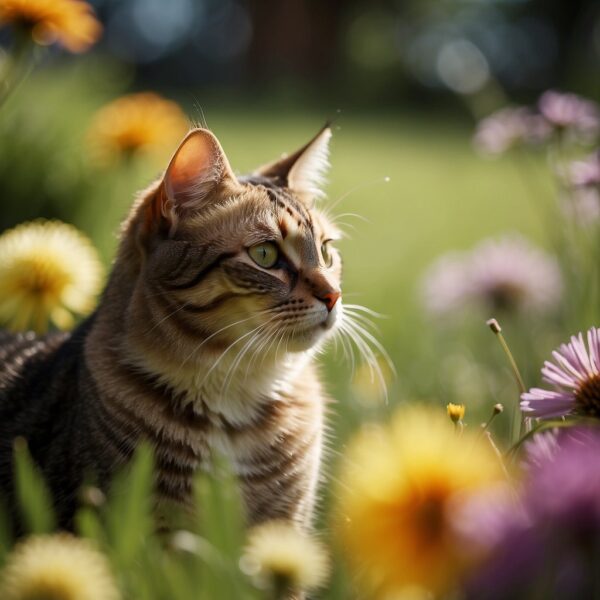
Why Does My Cat Eat Grass? Understanding Feline Grazing Habits
Cats often exhibit behaviors that perplex their guardians, one of which is the consumption of grass. While this behavior can seem counterintuitive, especially when it leads to vomiting, it has been observed across both domestic and wild felines. Scientists believe that there are several reasons a cat may be drawn to eating grass, one of which is the relief it provides from gastrointestinal upset. The act of vomiting after ingesting grass is thought to help a cat expel indigestible substances like hair from their stomach.
Eating grass can also be linked to a cat’s innate need to source certain micronutrients or address dietary fiber requirements, although cats on a complete and balanced diet are unlikely to be nutrient-deficient. In addition to potential health benefits, behavioral and psychological factors may play a role. The texture and taste of grass can be appealing to cats, and the chewing action has been suggested to be a stress-relieving activity. It’s also important for parents to be aware of the grass and plants their cats have access to, as some can be toxic.
Key Takeaways
- Cats eat grass possibly for digestive benefits, such as expelling indigestible matter and aiding in hairball relief.
- Grass intake might also fulfill a behavioral need, providing stress relief and potentially addressing nutrient deficiencies.
- Understanding the reasons and managing the risks associated with grass consumption can help maintain a cat’s health and wellbeing.
Understanding Cat Behavior
Cat behavior can often seem mysterious to their human companions, but their actions are grounded in instinct and individual preferences. By examining common behavioral traits, such as grazing and exploratory habits, one can gain insights into why cats engage in certain activities like eating grass.
Instinctual Grazing Behavior
Cats possess innate behaviors that often hark back to their wild ancestors. One such behavior is grazing, which refers to their consumption of grass. While domestic cats have their nutritional needs met through formulated diets, the instinct to graze persists. In the wild, this behavior might have been part of a self-medicative process to eject parasites or to induce vomiting for cleansing purposes. House cats may retain this instinct, consuming grass for reasons that might include:
- To alleviate discomfort from indigestible material in their stomachs.
- As a source of dietary fiber which can aid in digestion.
Curiosity and Taste Preferences
Cats are innately curious creatures and this extends to their exploration of tastes and textures. When cats encounter grass, their curiosity is often piqued by the texture and taste of the plant. Preferences can vary widely from one cat to another, with some having a particular inclination towards chewing on plants. It’s important to note that while curiosity often leads cats to taste grass, it is essential to ensure that the plants they have access to are non-toxic. Indulging in this curiosity should be monitored as it can lead to:
- Accidental ingestion of harmful plants.
- Development of pica, a condition where cats eat non-food items that can be spurred by nutrient deficiencies or emotional conflicts.
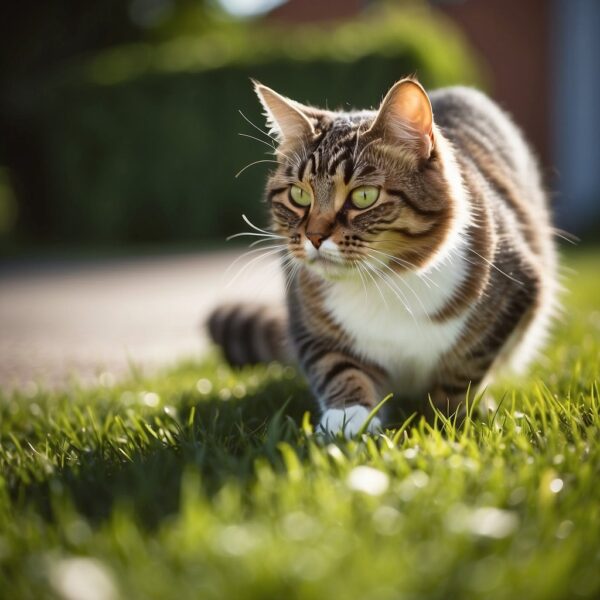
Health Benefits of Grass for Cats
Cats often eat grass to their advantage, as it serves to aid their digestive processes and provide them with certain nutritional benefits. The ingestion of grass can be a natural remedy for digestive issues and also introduce additional nutrients into a cat’s diet.
Digestive Aid and Hairball Control
Grass acts as a natural laxative for cats. It helps in easing the passage of hairballs through the digestive tract, which are common due to their grooming habits. The fibers in grass help bind the hair and stimulate the digestive tract’s movement, assisting in the expulsion of hair and other indigestible materials.
- Purging hairballs: Grass consumption leads to natural vomiting, which can help felines clear their stomachs of hairballs.
- Enzymatic stimulation: While cats lack the proper enzymes to fully break down grass, the act of eating it can still promote digestive activity.
Nutritional Contributions
Grass contains nutrients such as folic acid, which is essential for oxygen transport and overall cell function in cats. In addition, grass provides vitamins, minerals, and antioxidants that support feline health.
- Folic acid: An important B vitamin that supports the oxygen-carrying capacity of blood, which is vital for a cat’s energy levels and overall health.
- Vitamins and minerals: Essential components in a cat’s diet that support immune function and cellular health.
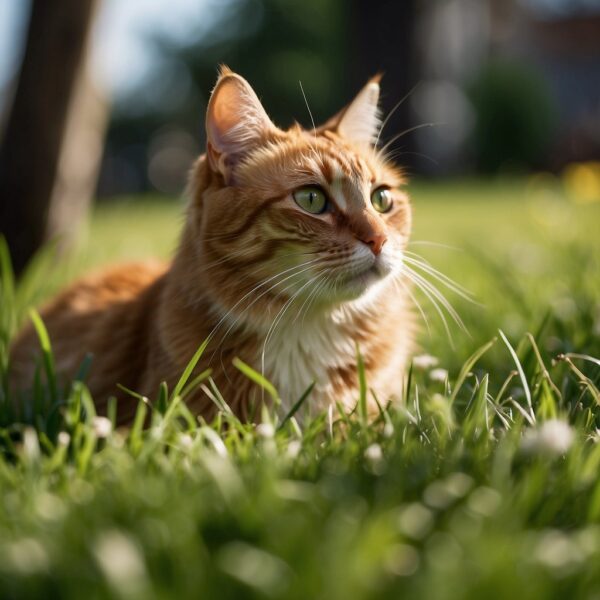
Potential Risks of Eating Grass
While eating grass can be a normal behavior for cats, there are potential risks associated with this activity that cat owners should be aware of. These risks mainly stem from the consumption of toxic substances and the exposure to outdoor hazards.
Toxic Substances and Plants
Cats may inadvertently ingest toxic chemicals such as pesticides, herbicides, or other poison if the grass they consume has been recently treated. Even small amounts of these substances can be harmful. Vomiting can occur if a cat consumes grass with these toxins, although it is sometimes a natural response to expel them. It’s also crucial to recognize that certain plants are toxic to cats; for example, lilies are extremely poisonous and can cause serious health issues if ingested.
Outdoor Hazards
When cats have outdoor access, they face additional risks:
- Contaminated grass: Exposure to chemicals and pollutants not visible to the naked eye.
- Parasites: Potential ingestion of harmful parasites that might be present in the outdoor environment.
- Unsupervised grazing: Cats may chew on plants that are dangerous or even fatal aside from grass, unknowingly consuming poisonous plants.
By being aware of these risks, cat owners can take preventative measures, such as ensuring their pet has access to safe and non-toxic greenery if they show an inclination to eat grass.
Diet and Digestive Health
Cats may indulge in grass-eating to manage digestive health, despite a diet that should typically meet their nutritional needs. Fiber in grass could aid with the passage of indigestible material, addressing stomach upset.
Cat Food and Nutritional Balance
Cat food is crafted to encompass a complete and balanced diet for felines. It typically includes essential nutrients, vitamins, minerals, and an appropriate amount of protein and fat tailored for cats at various life stages. Despite this, a cat might ingest grass if their diet doesn’t fully satisfy their natural instincts or if they experience vomiting to clear their digestive system of unwanted material.
- Complete Diet: A nutritionally complete cat food is intended to eliminate the need for additional supplementation.
- Protein & Fats: High-quality cat food comprises ample protein and fats which mirror a cat’s natural prey-based diet.
Role of Fiber in Feline Diet
While domestic cats not often require additional fiber beyond what is in their formulated food, they may seek out plant matter as a source of roughage, which can help with the expulsion of hairballs or other indigestible material. Plant fiber, such as that found in grass, might facilitate the transit of content through the digestive system.
- Digestive Aid: Fiber may help move hairballs or other substances through and out of the digestive tract.
- Stomach Relief: Some cats might consume grass to alleviate a sensation of discomfort due to an upset stomach.
It is imperative for cat owners to ensure that the grass their cats have access to is non-toxic and free from pesticides, as certain plants and chemicals are harmful to feline health.
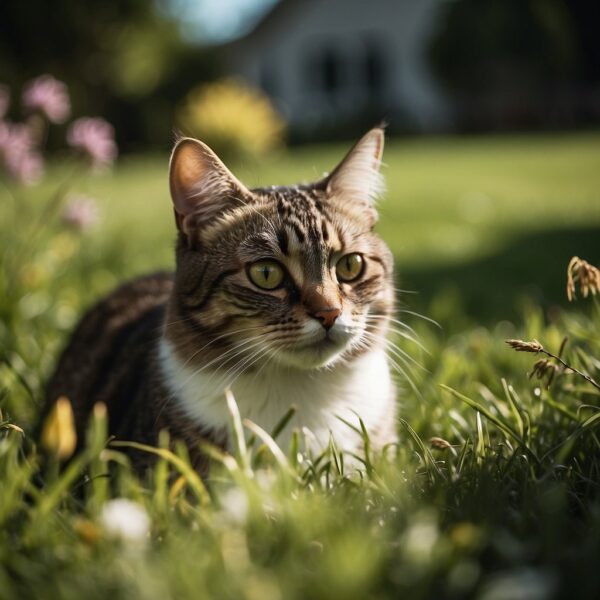
Behavioral and Psychological Aspects
Cats eat grass for reasons that may extend beyond the physical to include behavioral and psychological needs. Eating grass can be a natural part of a cat’s grooming process or a response to stress and anxiety.
Stress-Related Eating
Cats may use grass eating as a coping mechanism to deal with stress or anxiety. Like some humans engage in emotional eating or stress-snacking, a cat’s appetite for grass might increase during periods of psychological discomfort. Consuming grass can serve as a distraction and provides a soothing ritual in times of uncertainty or environmental changes.
Grooming and Eating Grass
Grooming is an instinctive behavior in cats, deeply rooted in their need for cleanliness and health maintenance. Ingesting grass can act as a natural aid in the grooming process by helping cats to expel indigestible materials such as hairballs. The grass may induce vomiting, allowing cats to remove fur and other substances from their stomachs, thus maintaining their digestive health.
Safe Grass Alternatives
Cat parents looking for safe grass alternatives for their cats can provide specially grown cat grass or select houseplants that pose no risk to feline health.
Providing Cat Grass and Houseplants
Cat grass is a term typically used for grasses that are safe for cats, such as wheatgrass, oat grass, or rye grass. These grasses are non-toxic and can be a healthy supplement for cats who enjoy nibbling on greenery. Houseplants can be tricky as many common plants are toxic to felines. However, there are several that can coexist safely with cats, such as bamboo, blue echeveria, and areca palm. It’s crucial for parents to ensure any houseplant within a cat’s reach is non-toxic and safe.
Grow Your Own Non-Toxic Varieties
For those with a green thumb, growing your own cat-safe plants can be both fun and rewarding. Cat parents can purchase cat grass growing kits to cultivate wheat or oat grass at home. These kits often include:
- Seeds: Typically wheat, oats, or rye.
- Soil: A growing medium suitable for the seeds.
- Instructions: Step-by-step guidance to ensure successful growth.
By growing their own grass, guardians can guarantee the absence of harmful pesticides and provide a fresh source of greens for their cats. Non-toxic varieties like ‘kitty grass’ ensure that cats can enjoy a bit of nature indoors without any health risks.
Addressing Health Concerns
While it’s common for cats to eat grass, cat parents should be vigilant about their cat’s health and behavior following grass consumption. If a cat frequently eats grass and vomits, it could signal an underlying health issue that may require professional attention.
When to Consult a Veterinarian
- Repeated Vomiting: If a cat vomits multiple times, or if there’s blood in the vomit, this warrants immediate veterinary care.
- Lethargy or Changes in Behavior: A cat that appears lethargic or exhibits changes in behavior after eating grass should be examined by a veterinarian.
- Appetite Loss: A loss of appetite following grass ingestion may indicate a more serious condition that requires a vet’s diagnosis.
- Continual Grass Eating: While occasional grass eating is normal, continual consumption may be a sign of an underlying issue and should be discussed with a vet.
Cat parents should monitor their cat’s overall well-being and consult their veterinarian when they observe signs of possible distress or illness.
Seasonal and Environmental Considerations
When discussing feline grass consumption, one must recognize that both seasonal fluctuations and the cat’s immediate environment play pivotal roles in influencing this behavior.
Summer Grazing Patterns
During summer, cats may exhibit increased grazing on grass, taking advantage of the lush growth. This season typically offers a variety of grass types, some of which may be more appealing or beneficial to cats than others. Owners should be mindful that treated grass with pesticides or fertilizers can pose health risks to cats.
Indoor Vs. Outdoor Access
Indoor cats often have limited access to fresh grass and may turn to houseplants, which could be harmful. Providing a safe type of grass indoors, like wheatgrass, can satisfy their grazing urge. In contrast, outdoor cats have ample opportunity to engage in grass eating. They instinctively avoid plants treated with chemicals, but the risk of ingestion is still present if such grasses are within their territory. Safe access to untreated, non-toxic grass is ideal, whether through an outdoor enclosure or monitored outdoor time.
Common Questions From Cat Parents
Pet parents often observe their cats eating grass and have questions about this behavior, especially if their cat shows a reduced interest in food or if the grass eating appears frequent.
Why Is My Cat Eating Grass But Not Food?
If a cat eats grass but not their usual food, this might indicate a health issue. Cats sometimes eat grass when they’re experiencing gastrointestinal distress, possibly to induce vomiting and relieve discomfort. However, if the cat consistently ignores its food in favor of grass, it could be a sign of an underlying medical condition, and a visit to the vet is advisable. Pet parents should observe if their cat is avoiding the litter box as well, which can provide additional clues to the cat’s health.
How Often Should Cats Eat Grass?
There are no strict guidelines on how often cats should eat grass as this behavior varies from one individual to another. In moderation, grass can be harmless and may even provide some fiber or help with hairball control. Nonetheless, pet parents should ensure that the grass their cats have access to is free of pesticides or other harmful chemicals. Fruits and plants toxic to cats should also be avoided in their environment. If a pet parent notices an excessive consumption of grass, it should be discussed with a veterinarian to rule out any health issues.
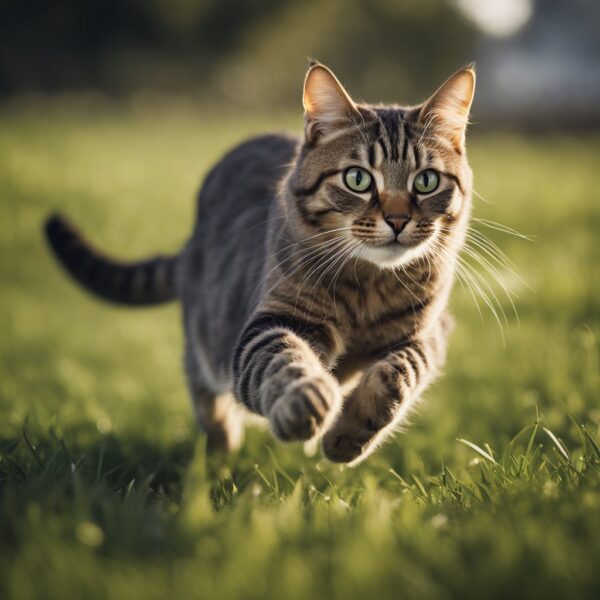
Frequently Asked Questions
This section addresses common queries surrounding the topic of cats consuming grass, reflecting our understanding based on observed behaviors and scientific insights.
What are the reasons for a cat eating grass regularly?
Cats may eat grass for several reasons including aiding digestion, expelling hairballs, or as a source of trace nutrients. Regular grass consumption is a natural behavior observed in domestic and wild felines.
Is there a connection between cats eating grass and experiencing digestive issues?
Grass eating in cats can stimulate vomiting, which may help them clear their digestive tracts of hairballs or other indigestible substances. However, consistent digestive upset may necessitate a veterinary consultation.
How can I tell if my cat eating grass is a sign of illness?
If a cat is eating grass and showing signs of distress, such as persistent vomiting, lethargy, or lack of appetite, it may indicate an underlying health issue. A veterinarian can provide a proper assessment.
What are the safe practices for allowing an indoor cat to consume grass?
For indoor cats, providing grass or cat-safe plants that are non-toxic and free of pesticides can safely satisfy their grass-chewing instincts. It is essential to ensure that the plants accessible to indoor cats are not harmful.
How much grass consumption is considered normal for cats?
Moderate, occasional grass eating is normal for cats. Frequent or compulsive eating of grass may be a sign that a cat is trying to address a dietary deficiency or discomfort.
What steps can be taken to manage or discourage my cat from eating too much grass?
To manage excessive grass eating, owners can ensure their cats have a balanced diet, provide alternative sources of fiber, engage them in activities, and monitor their behavior for potential health issues. If overeating persists, seeking veterinary advice is recommended.